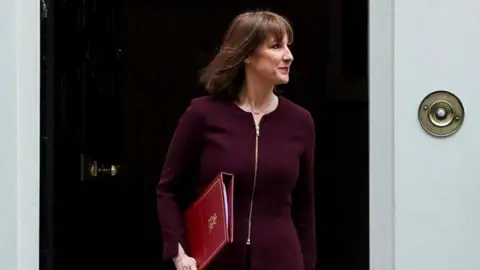Drakeford criticises Reeves on NI rise compensation
 Reuters
ReutersIt is "wrong" that Wales' public services face a shortfall of up to £65m due to the National Insurance increase, a Welsh minister has said.
Employers' NI contributions rise on 6 April and Chancellor Rachel Reeves had said the UK Treasury would cover the public sector costs. But Welsh Labour Finance Secretary Mark Drakeford said the UK Treasury was using the Barnett formula for its calculations, leaving Welsh public services short.
Barnett is how funding for Wales is usually worked out when there is extra spending in England on matters Cardiff ministers are responsible for.
Labour Blaenau Gwent Senedd member Alun Davies called the decision a "proper scandal". Plaid Cymru said it was "shocking".
Using the Barnett formula means that public sector employers in England, such as councils and the NHS, would be fully covered and those in Wales would not.
That is because the public sector in Wales is proportionately larger than in England.
Drakeford told Senedd members: "We should have been compensated for the actual costs not the Barnett share of the costs in England."
He said Chancellor Rachel Reeves was "wrong to do that".
"Treasury ministers had a choice to make, I believe they made the wrong choice."
Alun Davies described the population based formula as "not fit for purpose" and accused the UK government of breaking an agreement "where one government takes a decision which has a negative financial impact on another government then they should provide the costs in full".
Drakeford could not confirm what this would mean for public sector bodies in Wales, but said they would "look to see if there is anything further we can do to help those public services".
Describing the revelation as "shocking" the Plaid Cymru member Adam Price said "The Barnett formula is not just clearly unfair, it's also inconsistently applied and lacks transparency."
Analysis
By BBC Wales political editor Gareth Lewis
Back around the time when Eluned Morgan took over as first minister last summer two senior Welsh Labour figures suggested to me that it might not harm her to have an argument with her Labour colleagues in Westminster at some point.
In the week that the Welsh government published its long-awaited plans for bus franchising, two have now come along at once.
The row around welfare cuts spilled over again yesterday – the FM not happy with the way Welsh Secretary Jo Stevens had characterised her position on the reforms.
And now we have one of her predecessors, Mark Drakeford, bluntly saying that the chancellor is wrong to have calculated reimbursement for increased national insurance contributions in a way that leaves the Welsh public sector substantially short-changed.
Labour in Wales has an election looming and might feel it needs to have a falling out with the wider Labour family to show it is standing up for Wales.
But it is in a difficult position.
It really could have done with UK Labour delivering on this, and on issues such as rail investment.
The opposition parties will continue to point out that an argument is one thing, actually getting what you want is quite another.
Meanwhile, providers of public services which we all use are left counting the cost.
